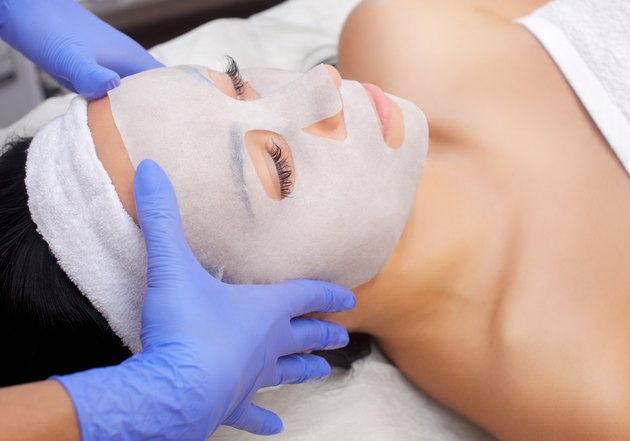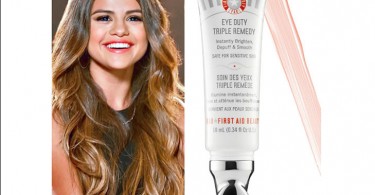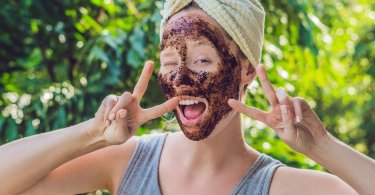These days you can't walk through drug store or scroll through your Instagram feed without stumbling upon a sheet mask. They're everywhere! What started out as a novelty product that could brighten skin in a pinch has evolved into a full-on beauty craze, with entire stores carrying nothing but the popular beauty item.

Sponsored Links
With a seemingly endless array of sheet masks available, though — and new ones popping up every day — it's nearly impossible to determine which ones should make the cut into your beauty arsenal and which ones you should skip.
To get the lowdown on everybody's favorite skincare product, we asked experts to weigh in on the most common sheet mask ingredients. From the products guaranteed to leave everyone's skin dewy and plump to the ingredients most likely to cause breakouts, here's everything you need to know about what's inside your sheet mask.
Good-for-You Ingredients
1. Hyaluronic Acid
If you're sheet masking without hyaluronic acid, are you even sheet masking? Dermatologists across the board agree that hyaluronic acid is a perfect addition to any skin care regime, regardless of the issue you're targeting.
"Hyaluronic acid is a great moisturizing agent," says dermatologist Debra Jaliman, MD, author of Skin Rules. "It's super hydrating, has anti-aging properties and helps prevent water loss. Additionally, it works well for all skin types, particularly dry skin."
2. Vitamin C
From ubiquitous serums to sweet-smelling moisturizers to, of course, sheet masks, it's safe to say that vitamin C is officially having a skin care moment. The reason? It works.
"Vitamin C is an ideal face mask ingredient not only because it's a potent antioxidant that combats free radical damage, but it also interferes with abnormal pigment production," says New York City dermatologist Joshua Zeichner, MD. "Face masks that offer high concentrations of vitamin C delivered directly to the skin can deliver super quick results."
3. Green Tea
Just as consuming green tea has been touted to do everything from fight cancer to control cholesterol, applying it to your face packs a healthy punch, as well. Research has show that using products containing green tea, such as sheet masks, can provide a host of complexion benefits, including promoting DNA repair (which can help fight skin cancer and combat signs of aging) and treating acne by unclogging pores.
4. Aloe Vera
Surely, you've heard — or learned — that aloe vera works wonders on skin that's seen too much sun, but a 2008 review from the Indian Journal of Dermatology also found that the enzymes in aloe vera can improve skin's integrity, reduce fine lines, and, thanks to it's anti-inflammatory properties, help treat mild surface acne.
5. Snail Secretion Extract
It may not sound appealing, but don't write off sheet masks containing snail secretion extract just yet. "It may sound a little gross, but snail slime is rich in hyaluronic acid, which offers skin plumping and hydration benefits," Dr. Zeichner says. "The connection between certain types of snail extracts and skin brightening benefits are also currently being researched as well."
Advertisements
6. Ceramides
Ceramides are always a good idea. "Products containing ceramides are great because, in addition to locking in moisture, they help protect the barrier of the skin, which firms and plumps," says Dr. Jaliman. Not only are these lipids ultra-moisturizing, they help restore the skin's barrier. Also, unlike some moisture-rich face mask ingredients, they're compatible with basically every skin type.
Ingredients to Use With Caution
1. Egg Whites
There's been an uptick in skin products containing egg whites recently, but before you put an egg on it, consider your skin type. Masks containing egg are on the heavier side and have been known to cause breakouts, so you may want to forgo if you have acne-prone skin.
And while you're at it, you may want to skip the sheet masks altogether if your skin is particularly temperamental. "If you're prone to acne, I don't recommend using sheet masks," says Dr. Jaliman. "Because of the occlusion, there's a good chance they're just going to exacerbate your breakouts."
2. Coconut Oil
Sure, coconut oil has its skin benefits, but if you tend to break out, it's best left to areas below the neck. "Although it has been widely stated that coconut oil can help fight acne due to its antibacterial properties, I would stay away from it if your skin is very oily and/or acne prone," Dr. Jaliman says. "It's very rich and may end up clogging your pores. Why risk it?"
3. Charcoal
These days, it seems like almost every skin care product contains charcoal, but unless your skin is on the oily side, you may want to skip it. "If your skin is very dry, I would steer clear of products with charcoal," says Dr. Jaliman. "Charcoal eliminates excess oil that could lead to blackheads and acne, but if you have dry skin, it will only make it drier."
Ingredients to Avoid
1. EthyleneOxide
Unfortunately, it isn't uncommon for beauty products, including sheet masks, to contain ethylene oxide, which isn't listed as an ingredient, but found in the form of trace amounts in PEG chemicals (some sheet masks contain PEG-6.).
On it's website, the National Cancer Institute states that ethylene oxide's primary use to produce other chemicals, including antifreeze, pesticide and sterilizing agents. "The ability of ethylene oxide to damage DNA makes it an effective sterilizing agent but also accounts for its cancer-causing activity." Something you want to slather on your face? Probably not.
2. SheaButter
With its essential fatty acids and vitamins A and E, shea butter makes for an excellent moisturizer — for your body, that is. "Shea butter is a rich emollient that helps soften rough cells on the outer skin layer and offers great hydration," says Dr. Zeichner. "It's most commonly used in body moisturizers, but it does pop up in face products — including sheet masks — on occasion. I definitely wouldn't recommend applying straight, natural shea butter directly to the face, as it may clog pores and lead to breakouts."
3. Sodium Laureth Sulfate
When it comes to sheet mask ingredients, it's best to skip ones containing sodium laureth sulfate. In addition to the ongoing debate about whether or not sodium laureth sulfate — found in many shampoos, cosmetics and beauty products — causes cancer, this chemical has been linked to skin irritation.
A 2010 report published in the International Journal of Toxicology revealed that, in addition to skin and eye irritation, sodium laureth sulfate may cause itchy scalps and hair loss when used in shampoos. An ingredient you want in your sheet mask? We think not.



Comments